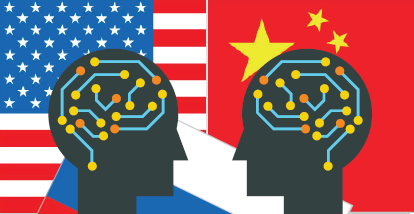Hello!
Welcome to Hold The Code #15.
In this edition, we cover Elon Musk's bitcoin swerve, news with Google's AI Ethics department, the NFT origin story, and a recent call to "Stop the emerging AI Cold War."
We're also excited to welcome the newest member of the Hold The Code team: Larina Chen, a computer science freshman studying at the McCormick School of Engineering.
Until next week!
Flip (B)it and Reverse (B)it
The announcement
Tesla CEO, Elon Musk, announced last week on Twitter that Tesla will be halting vehicle purchases using Bitcoin due to the environmental impact of this cryptocurrency.
In his statement, Musk said that while Tesla believes that “[cryptocurrency] has a promising future...this cannot come at great cost to the environment.” Tesla will not be selling or accepting Bitcoin until its mining transitions to a more sustainable energy source. However, Tesla is still looking at other cryptocurrencies that use less than 1% of Bitcoin’s energy.
The reaction
In response, the price of Bitcoin dropped by 5% within a few minutes of Musk’s tweet.
Before the announcement, Musk had been quite a prominent proponent of Bitcoin and other cryptocurrencies.
Not everyone agrees with Musk’s point of view on the issue though. After the announcement, Mark Cuban, owner of the Dallas Mavericks, tweeted that the team would continue to accept cryptocurrencies, claiming that “replacing Gold as a store of value will help the environment and [shrink] big bank [sic] and coin usage.”
Read more
To read more about our coverage of the environment-versus-Bitcoin controversy, check out A Bit Eco-Unfriendly from our 8th edition of Hold the Code.
The Google Saga Continues
You might remember our previous newsletter editions, which covered the drama surrounding the departure of prominent AI ethics researchers — Timnit Gerbu and Margaret Mitchell — from Google.
The latest development:
In a bid to strengthen its highly scandalized AI ethics department, Google's CEO, Sundar Pichai, has vowed to double the size of the department to 200 researchers and boost the size of the operating budget considerably.
Marian Croak, Google's new AI Ethics department head, intends to also emphasize diversity in hiring. Croak is one of very few senior Black executives at Google; Black women account for 1.2% of their workforce. Having previously served as chair of Google’s Black Leadership Advisory Group, she has been active in calling for Silicon Valley companies to improve their diversity.
So, are we GOO((D))-gle?
Some aren't so sure. External groups such as Black in AI and Queer in AI recently released a joint statement that criticized Google for "setting a dangerous precedent for what type of research, advocacy, and retaliation is permissible in our community.”
What do we think?
This is a step in the right direction: Marian Croak seems incredibly qualified for the position. Check out this blog post, "Marian Croak's vision for responsible AI at Google," to see what we mean.
NF-The What??
And what digital cats have to do with it.
NFT - explained
Crash course time: a non-fungible token (NFT) represents a unique piece of digitally stored work – for example, a digital rendering of this part-cat, part-pop tart, rainbow-spewing ball of happiness. Buying an NFT is essentially purchasing ownership of a universally unique piece of artwork, or digital album, or whatever digital work the NFT is linked to. Although NTFs are built upon the same blockchain technologies as in cryptocurrencies like Bitcoin, unlike crypto coins, an NFT cannot be traded for another because they are each unique.
What do cats have to do with it?
The phrase NFT wasn't popularized until the CryptoKitties, a game that allows players to breed and trade digital cats created by the NFT company Dapper Labs in 2017. Implemented on the Ethereum network, users stored complex documents like financial contracts behind the unsuspecting kitties (they are kittens, after all!). In a sense, these kittens set off an NFT explosion and a consequential digital art boom.
Is a picture really worth a thousand ethers?
In February 2021, the NFT connected to the pop tart cat (or officially, the Nyan Cat, a 2011 meme) was sold for 300 ethers in crypto, which was worth a whopping $600,000 at the time.
Remember, purchasing the NFT grants the buyer only the ownership of the digital work it is linked to.
In other words, a single person technically "owns" the authentic copy of the Nyan Cat, but anyone with an Internet connection can view the artwork. Many have questioned whether the technical "ownership" of a publicly viewable Internet meme is really worth the $600,000 – is a picture really worth a thousand (or possibly more) ethers?
Read the full story here.
Weekly Feature: An Impending AI Cold War...
This March, the National Security Commission on Artificial Intelligence (NSCAI) recommended that the US should accelerate its AI technologies to compete with China and Russia and maintain national security.
What does this mean for AI ethics? The potential for competitive AI warfare.
The militarization of AI has the potential to change war completely. The recent Colonial Pipeline attacks are a prime example of how emerging technologies create physical damage from a cyberworld. Not only does the NSCAI recommendation have potentially dangerous ramifications, but it also impedes international cooperation efforts regarding the use of safe technologies. AI warfare is also likely to target civilian communities, as it is more integrated into our daily lives unlike nuclear weapons, and can potentially be programmed to make decisions to kill.
The NSCAI, formed by Congress two years ago, advocates for “the integration of AI-enabled technologies into every facet of war-fighting,” a stark contrast to the European Commission's guidelines of making AI more humane and human-driven. This could impede the United States’ global reputation regarding AI ethics.
Denise Garcia, professor at Northeastern University and the vice-chair of the International Committee for Robot Arms Control, said that the rhetoric around AI competition is dangerous:
“In my view, rather than focusing on counting weapons or on particular weapons systems, policies should specify human intention and human–machine interaction, obligating countries to maintain human control over military force.”
Check out the full story here.
Written by: Larina Chen, Sophie Lamb, Molly Pribble, and Lex Verb









Nicely done!!